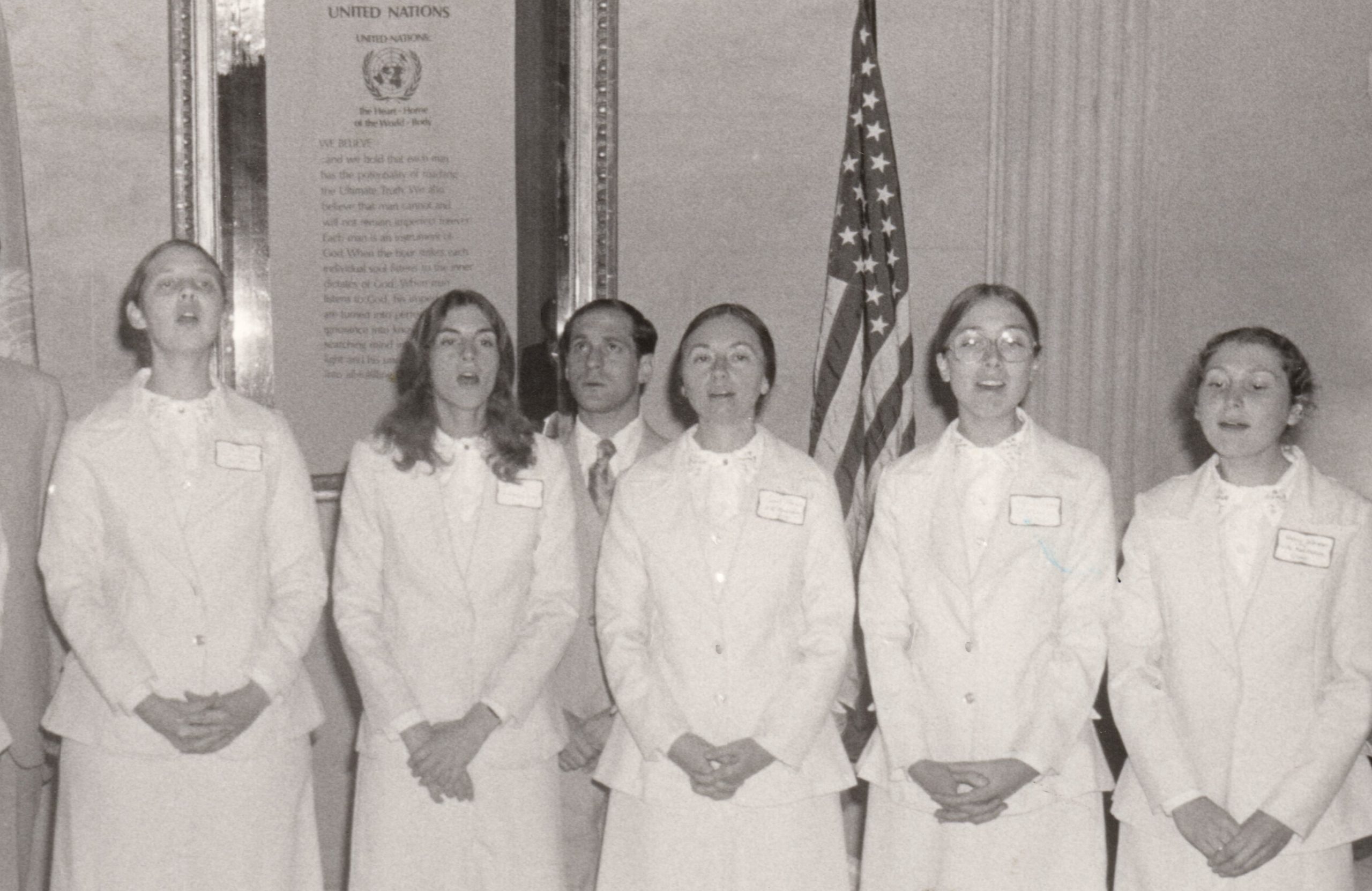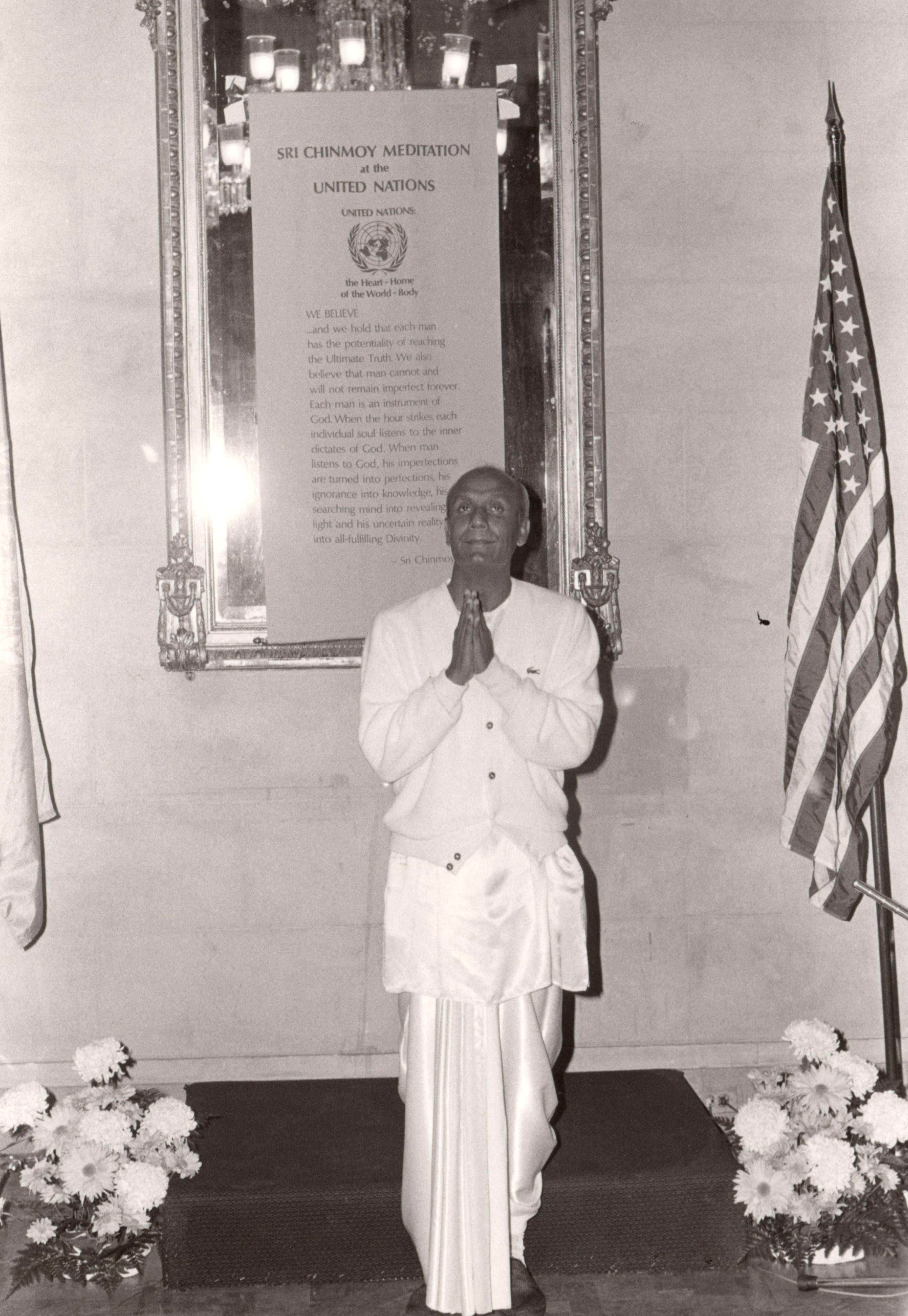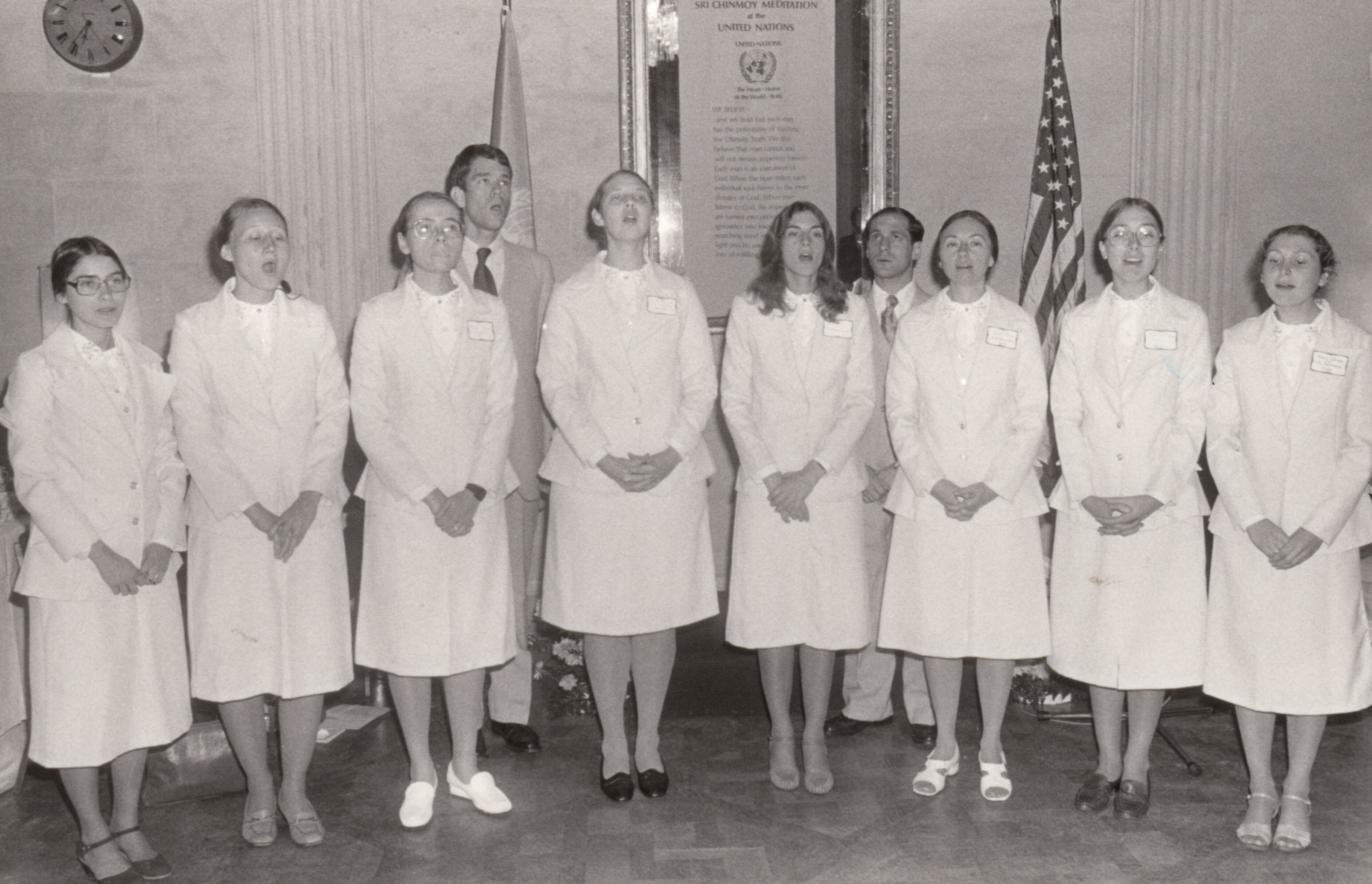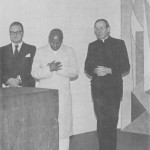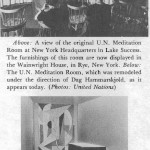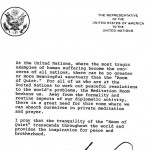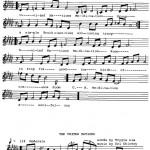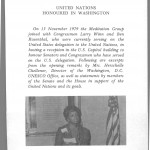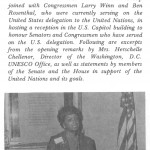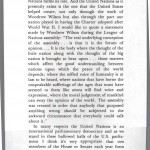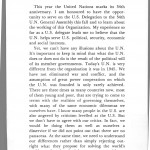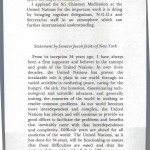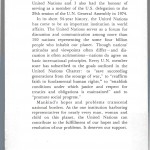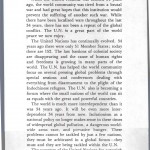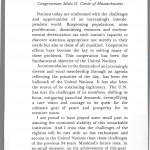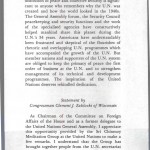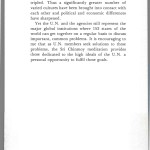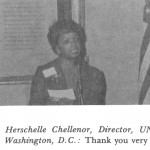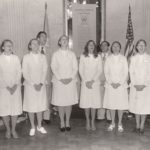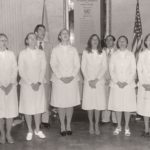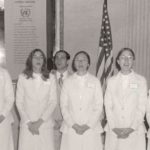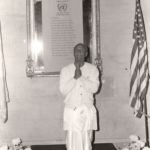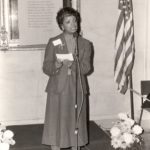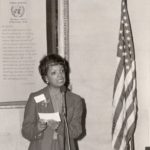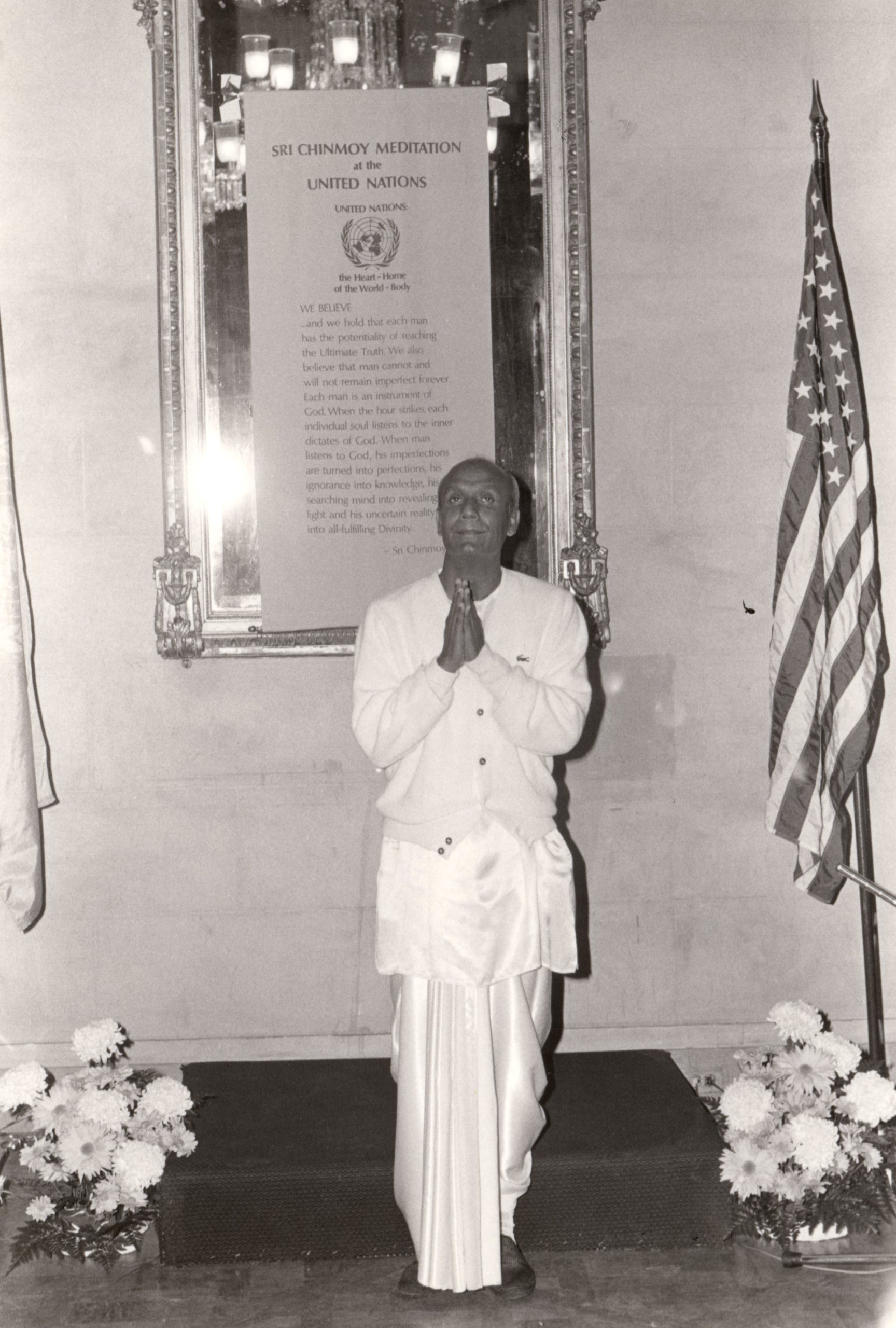Programme in Support of UN Ideals Held in US Capital 13 Nov 1979
Filed under americas | Role of meditation at UN - Practical Guidance | Tributes and Expressions of appreciationWASHINGTON – The Peace Meditation Group at the United Nations participated in a programme Nov. 13 for U.S.A.Senators and Congressmen whose careers have included stints at the U.N.
The reception, which was co-hosted by Congressmen Benjamin Rosenthal (D-New York) an Larry Winn, Jr. (R-Kansas), included a short musical recital by Sri Chinmoy and the Peace Meditation Group Choir.
On 13 November 1979 the Meditation Group joined with Congressmen Larry Winn and Ben Rosenthal, who were currently serving on the United States delegation to the United Nations in hosting a reception in the U. S. Capitol building to honour Senators and Congressmen who have served on the U. S. delegation. Following are excerpts from the opening remarks by Mrs. Herschelle Chellenor, Director of the Washington D . C. UNESCO Office, as well as statements by members of the Senate and the House in support of the United Nations and it’s goals.
Mrs. Herschelle Chellenor, Director, UNESCO Office, Washington, D. C.:
Thank you very much.
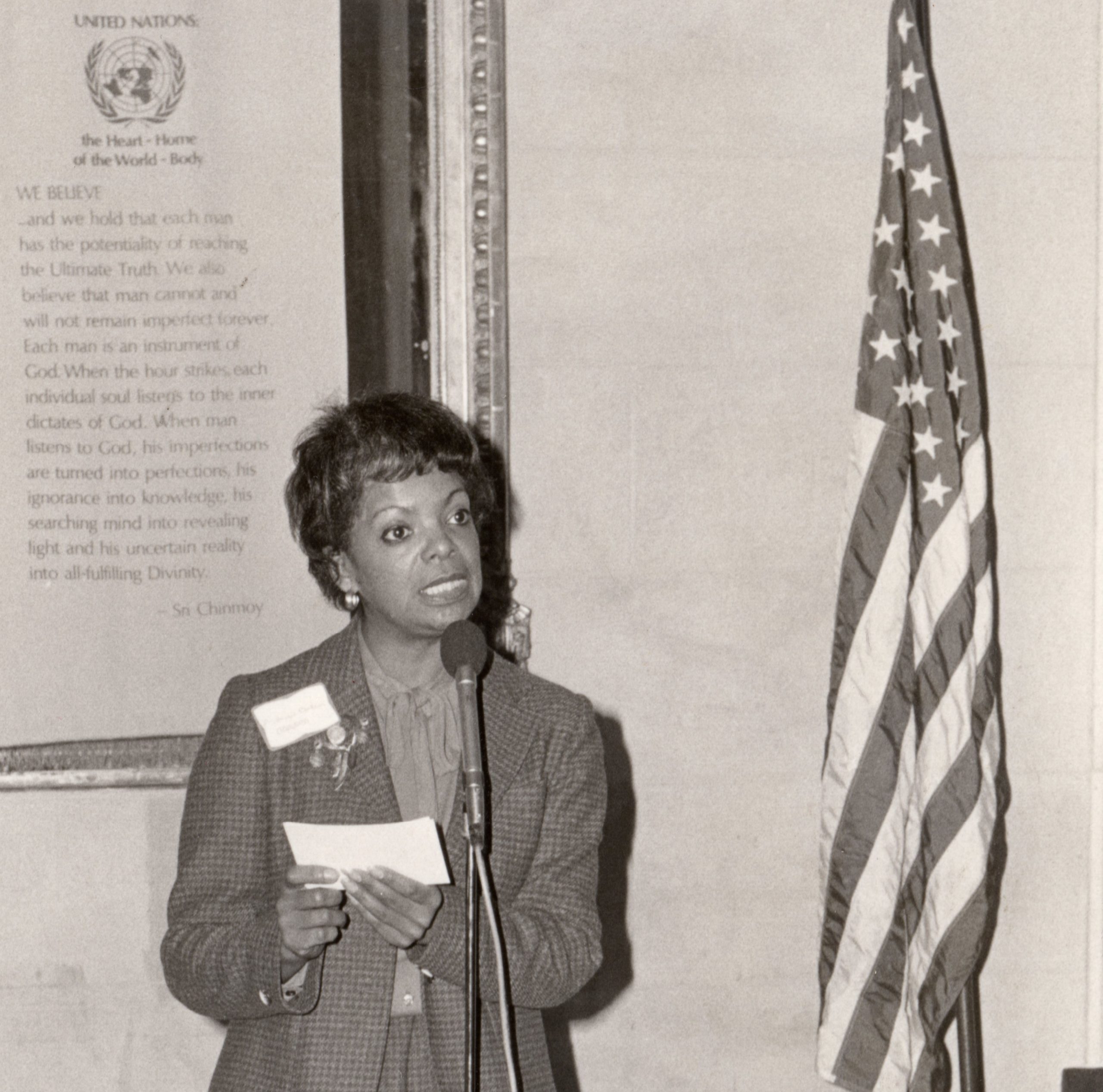
1979-11-nov-13-usa-delegates-honored-in-Wash-DC-Herschelle-Chellenor-Dir-UNESCO-Office-Wash-crp-scaled.jpg – 654 KB
After the World War, one of the difficulties that the United States faced was trying to relate to the rest of the world. Today, the facilitation of this relationship is on e of the many ways the United Nations fulfils its role. And the United Nations as it presently exists is the one that the United States helped create, not only through the work of W oodrow Wilson but also through the part our nation played in having the Charter adopted after World War 11. I would like to quote a statement made by Woodrow Wilson during the League of Nations assembly: “The real underlying conception of the assembly … is that it is the forum of opinion …. It is the body where the thought of the little nation alon g with the thought of the big nation is brought to bear upon . . . those matters which affect the good understanding between nations upon which the peace of the world depends; where th e stifled voice of humanity is at last to be heard, where nations that have borne the unspeakable sufferings of the ages that must have seemed to them like aeons will find voice and expression, where the moral judgement of mankind can sway the opinion of the world. The assembly was created in order that anybody that purposed anything wrong should be subjected to the awkward circumstance that everybody could talk about it.” In many respects the United Nations is an international parliamentary democracy and as we stand in these hallowed halls of the U.S. parliament I think it’s very appropriate that two members of the House or Senate each year form part of the United States delegation to the United Nations. It was my great privilege to serve on the same delegation as Larry Winn and Ben Rosenthal, and I think they offered the best that this nation and this institution represents.
Statement by Congressman Larry Winn of Kansas
This year the United Nations marks its 34th anniversary. I am honoured to have the opportunity to serve on the U.S. Delegation to the 34th V.N. General Assembly this fall and to learn about the working of this Organization. My experience so far as a V.S. delegate leads me to believe that the V.N. helps serve V.S. political, security, economic and social interests. Yet, we can’t have any illusions about the V.N. It’s important to keep in mind that what the V.N. does or does not do is the result of the political will of its member governments. Today’s V.N. is very different from the organisation it was in 1945. We have not eliminated war and conflict, and the assumption of great power cooperation on which the V.N. was founded is only rarely achieved. There are three times as many countries now, most of them young and poor, that are trying to come to terms with the realities of governing themselves, with many of the same economic dilemmas we ourselves have. I know many people in the V.S. are also angered by criticism levelled at the V.S. But we don’t have to agree with our critics. In fact, we would be doing them as well as ourselves a disservice if we did not point out that there are no panaceas. At the same time, we need to understand our differences rather than simply rejecting out-right what they propose for solving the world’s problems when they don’t happen to agree with our own views. We will not resolve those differences by trying to “stop the world and get off.” We would do well to listen and understand why it is that our country, a fairly young country, built on the principles of the Declaration of Independence, is so widely perceived as acting against those ideals that spark the hopes of mankind. I applaud the Sri Chinmoy Meditation at the United Nations for the important work it is doing by bringing together delegations, N.G.O.s and Secretariat staff in an atmosphere which can further international understanding.
Statement by Senator Jacob Javits of New York
From its inception 34 years ago, I have always been a firm supporter and believer in the concept and goals of the United Nations. In over three decades, the United Nations has proven the invaluable role it plays in our world through its varied activities in mediating peace, caring for the hungry, the sick, the homeless, disseminating technological and scientific advances, and generally uniting the countries of the world in working to resolve common problems. As our world becomes more interdependent and complex, the United Nations has always and will continue to provide its good offices to facilitate the problems and benefits that inevitably come with that interdependence and complexity. Difficult years are ahead for all countries of the world. The United Nations, as it has done for 34 years, will be functioning to ensure that those difficulties are eased and that the nations of the world, with all their differences, can sit together, learn from each other and work III harmony to make it a better world for all. 26
Statement by Senator Charles H. Percy of Illinois
I have long had a special interest in the United Nations. My work on the Senate Foreign Relations Committee has brought me in close touch with the United Nations and I also had the honour of serving as a member of the U.S. delegation to the 29th session of the U.N. General Assembly in 1974. In its short 34-year history, the United Nations has come to be an important institution in world affairs. The United Nations serves as a forum for discussion and communication among more than 150 nations representing the some four billion people who inhabit our planet. Though nations’ attitudes and viewpoints often differ-and discussion is often acrimonious -nations do agree on basic international principles. Every U.N. member state has subscribed to the goals outlined in the United Nations Charter: to “save succeeding generations from the scourge of war,” to “reaffirm faith in fundamental human rights,” to “establish conditions under which justice and respect for treaties and obligations is maintained” and to “promote social progress.” Mankind’s hopes and problems transcend national borders. As the one institution harboring representatives for nearly every man, woman and child on this planet, the United Nations can contribute to the fulfillment of our hopes and the resolution of our problems. It deserves our support.
Statement by Congressman Don Bonker of Washington
When the United Nation s was formed 34 years ago, the world community was tired from a brutal war and had great hopes that this institution would prevent the suffering of another such war. While there have been localized wars throughout the last 34 years, there has not been a repeat of the global conflict. The U.N. is a great part of the world peace we now enjoy. The United Nations has continually evolved. 34 years ago there were only 51 Member States; today there are 152. The last bastions of colonial society are disappearing and the cause of human rights and freedoms is growing in many parts of the world. The U.N. has helped the world community focus on several pressing global problems through special sessions and conferences dealing with everything from disarmament to the plight of the Indochinese refugees. The U.N. also is becoming a forum where the small nations of the world can sit as equals with the great and powerful countries. The world is much more interdependent than it was 34 years ago. It will be even more inter-dependent 34 years from now. Isolationism as a national policy no longer makes sense in these times of widespread global pollution, a dangerous world-wide arms race, and pervasive hunger. These problems cannot be tackled by just a few nations, they must be arbitrated in a global forum-they must and they are being tackled within the U.N. The successes of the United Nations far outweigh its failures. The recent eradication of the killer smallpox from the face of the earth is but one example. The United Nations is not perfect. But it is the only institution whose mandate is the protection of one small blue planet-our Earth-our home, and we celebrate its 34th anniversary.
Statement by Congressman Silvio O. Conte of Massachusetts
Nations today are confronted with the challenges and opportunities of an increasingly interdependent world. Burgeoning populations, arms proliferation, diminishing resources and environmental deterioration tax each nation’s capacity to discover solutions. appropriate not merely to their needs but also to those of all mankind. Cooperative efforts have become the key to solving many of these problems. This cooperation has been the fundamental objective of the United Nations. Accommodation to the demands of an increasingly diverse and vocal membership through an agenda reflecting the priorities of the day, has been the hallmark of the United Nations. It has also been the source of its continuing legitimacy. The U.N. has met the challenges of its members, shifting its focus, mitigating parochial demands, exemplifying a rare vision and courage in its quest for the ultimate goal of peace and prosperity for its member states. I am proud to have played some small part in assuring the continued viability of this remarkable institution. And I trust that the challenges of the eighties will be met with no less enthusiasm and success in the United Nations than those challenges of the previous 34 years. Mankind’s future rests, in no small measure, on the achievement of this goal. 29
Statement by Senator Abe Ribicoff of Connecticut
The inspiration of the United Nations as an institution of peace and collective security is significant to anyone who remembers why the U.N. was created and how the world looked in the 1940s. The General Assembly forum, the Security Council peacekeeping and security functions and the work of the specialised agencies have constructively helped mankind share this planet during the U .N.’s 34 years. Americans have understandably been frustrated and skeptical of the flourishes of rhetoric and overlapping U.N. programmes which have accompanied the growth of the U.N. But member nations and supporters of the U.N. system are obliged to keep the primacy of peace the first order of business at the U . N. and to strengthen management of its technical and development programmes. The inspiration of the United Nations deserves rekindled dedication.
Statement by Congressman Clement J.Zablocki of Wisconsin
As Chairman of the Committee on Foreign Affairs of the House and as a former delegate to the United Nations General Assembly, I appreciate this opportunity provided by the Sri Chinmoy Meditation Group at the United Nations to make a few remarks. I understand that the Group has brought together people from the U.N. secretariat staff and Missions to the U . N . from various countries and cultures. Through their activities, these young people have a chance to develop a better understanding and respect for each other’s point of view.
34 years after the United Nations was created, we have perhaps an even greater need for mutual respect and understanding among the peoples of the world. The V.N. today is very different from what it was in 1945. Its membership has virtually tripled. Thus a significantly greater number of varied cultures have been brought into contact with each other and political and economic differences have sharpened. Yet the V.N. and the agencies still represent the major global institutions where 152 states of the world can get together on a regular basis to discuss important, common problems. It is encouraging to me that as V.N. members seek solutions to these problems, the Sri Chinmoy meditation provides those dedicated to the high ideals of the V. N. a personal opportunity to fulfil those goals.
Below is excerpt of the introduction to part of the programme:
Welcome to this program being held in honor of the members of Congress who have served, over the years, on the U.S. delegation to the U.N
The Program is being sponsored by our current delegates to the United Nations, Congressmen Larry Winn and Benjamin Rosenthal, in cooperation with the Meditation Group at the UN·
Before proceeding with our program, I would like to tell you just a little bit about the Peace Meditation Group at the UN–who we are and what we are seek1ng to accomplish.
You may ask yourself: ” what meditation has to do with the UN, and why the Meditation Group is even involved in an affair like this evenings?”. The answer is quite clear if we think for a moment what meditation really is.
1. Meditation is the process of going deep within ourselves and bringing forward our own highest ideals and resources.
a. Meditation–whether conscious or unconscious–is the source of many things worthwhile that man has ever created or achieved.
b. We may call the dream that gave birth to the UN, or the UN itself , man’s highest “political- meditation.
2. Right from the beginning, meditation has played a key role in the minds of the founders and leaders of the UN
a. Prayer and meditation rule for the UN General Assembly – Invitation by President of GA at opening and before closing of GA Session.
b. Lake Success (original home of the UN) prayer and meditation room (programe celebrated August 1978 at Wainwright House)c. Dag Hammarskjold redesigned Meditation Room- “Room of quiet” (programme celebrated – Nov 1978 at UN)\
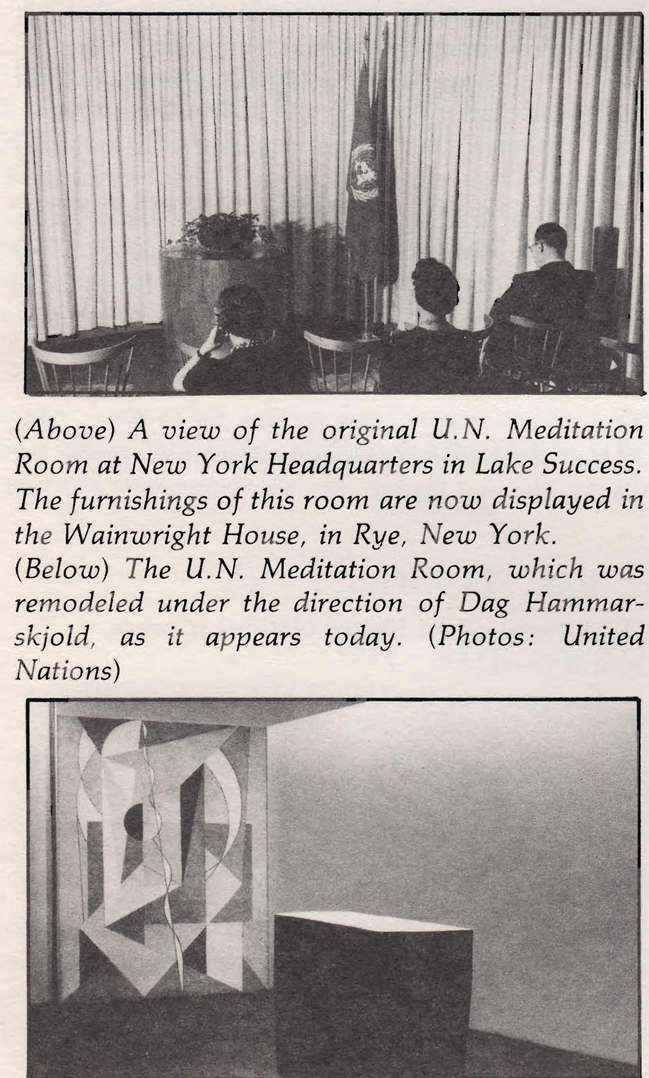
3. Meditation group . formed in 1970, is a continuation of this spiritual undercurrent that has coursed through the UN from its inception.
a. based on belief that lasting world peace requires not only action on the political and socioeconomic level, but also a parallel spiritual effort
4. What Meditation Group does
a. Silent meditation–led by Sri Chinmoy–These moments of silent reflection and regrouping make us aware Of our real purpose at the UN– which can easily be forgotten amid the press of daily affairs. It brings us in touch with the same inner reality that also gave birth to the UN itself years ago.
b. Non-silent meditation–colloquia, symposia, etc . where different missions and delegates from each country can articulate their own vision for a better world. This is also a form of meditation. In fact we feel, anything that inspires us like this programme, —anything that awakens us to a higher purpose can be a real meditative action.
5. It is in this spirit that the Peace Meditation Group at the UN is working. I can refer you to some of our year end “Devoted Reports to the S-G to give very many examples of the programmes undertaken. See our Devoted Report ( Link to reports for 1977 & 1978)
6. Now I would like to invite you to listen to • still a different kind of meditation–through music–Songs Sri Chinmoy has written about the UN–songs that, like silent meditation, awaken us to the highest ideals that the UN represents and which many have tried to bring to the fore. I invite now the Peace Meditation at the UN Choir to come up.
Click on image below for larger or different resolution photo – Image:
- bu-scpmaun-1977-08-27-vol-05-n-08-aug_Page_08-orig-med-room
- bu-scpmaun-1980-04-27-vol-08-n-04-apr_Page_31.j
- bu-scpmaun-1980-04-27-vol-08-n-04-apr_Page_39.jpg July 10, 2012
- bu-scpmaun-1980-04-27-vol-08-n-04-apr_Page_31-mrs-chellenor-unesco-wash-dc.jpg – 289 KB
- 1979-11-nov-13-usa-delegates-honored-in-wash-peace-meditation-choir-scaled.jpg – 520 KB
- 1979-11-nov-13-usa-delegates-honored-in-wash-peace-meditation-choir-crp-scaled.jpg – 496 KB
- 1979-11-nov-13-usa-delegates-honored-in-wash-peace-meditation-choir-crp2-scaled.jpg – 460 KB
- 1979-11-nov-13-usa-delegates-honored-in-wash0-open-meditation-Sri-Chinmoy-crp-scaled.jpg – 544 KB
- 1979-11-nov-13-usa-delegates-honored-in-Wash-DC-Herschelle-Chellenor-Dir-UNESCO-Office-Wash-scaled.jpg
- 1979-11-nov-13-usa-delegates-honored-in-Wash-DC-Herschelle-Chellenor-Dir-UNESCO-Office-Wash-crp-scaled.jpg – 654 KB
- 1979-11-nov-13-usa-delegates-honored-in-wash0-open-meditation-Sri-Chinmoy-scaled.jpg – 534 KB
